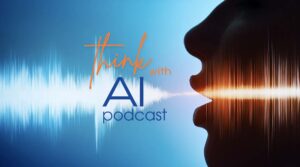For two decades, marketers have lived and died by Google’s search rankings. We all fought for page-1, first position, using backlinks, optimized every keyword, fought for authority, and celebrated when we landed on top of page one, at least for the moment it lasted.
But the online search landscape is changing fast. Today, millions of people no longer start their search with just traditional Google search, they start with AI tools like ChatGPT, Perplexity, or Gemini.
These platforms don’t give you a list of ten blue links. They give a single, authoritative answer, and more. And the question every marketer needs to ask is this: when AI answers the questions of your potential customers, will it cite your company, or your competitor?
Why AI Citations Are the New Marketing Frontier
When someone turns to an AI tool for help, they’re not browsing casually. They’re asking specific, high-intent questions:
- “What’s the best strategy?”
- “Which provider should I trust?”
- “How do I solve this exact problem?”
Being cited inside those AI answers is the digital equivalent of being the one expert quoted in a national news story. It’s trust, credibility, and visibility, delivered at the exact moment a decision is being made. Neil Patel That’s why marketers can’t just think of AI platforms as a side trend that will fade. They’re becoming a front door to new customers and clients, and so much more.
How AI Decides Who to Cite
AI platforms aren’t random in their selections. They pull from content that signals credibility and authority. Four things matter most to AI citations:
- Credibility – high-trust domains like Wikipedia, news outlets, and government or education sites Stanford HAI
- Authority signals – strong backlinks, expert authorship, and content with reliable citations MOZ
- Engagement – active discussions on platforms like Reddit, where real people ask and answer questions Search Engine Journal
- Structure – content that’s written clearly, sourced properly, and easy for AI to parse OpenAI
This is why traditional SEO isn’t dead. Backlinks and authority still play a role. As Neil Patel points out, ranking in Google’s top 10 is often what even makes you eligible to appear in Google’s AI Overviews. But backlinks alone won’t get you cited by AI.

Image generated by OpenAI’s DALL·E via ChatGPT
The Platforms That Matter Most
If you want AI systems to pull your content, you need to be visible across the sources they trust the most. Right now, that means these 4 are critically important.
- Wikipedia – A neutral, verifiable reference layer. If you or your company meet notability, being included here builds lasting authority Wikipedia Notability Guidelines
- Reddit – Authentic, intent-rich discussions where users openly share pain points and solutions. These threads increasingly show up in both Google results and AI-generated answers Search Engine Journal
- YouTube – With transcripts now indexed and metadata tied to search, videos give AI another pathway to recognize your content Think with Google
- Your own website or blog – Still the anchor. Long-form, research-backed articles remain the foundation of credibility.
Together, these create a “citation web” that tells AI platforms: this brand is trusted across multiple authorities.
Important Reminder: Don’t Abandon Link Building
Here’s the mistake some marketers will make. They assume AI visibility means they can walk away from SEO tactics. That would be a costly error. Backlinks still matter. Google uses backlinks to determine ranking, and ranking is still what determines if you even show up in AI Overviews. MOZ But as Patel emphasizes, the era of spending thousands every month on low-quality or purchased link building is fading
The shift is about balance. Backlinks help you rank, but AI citations require more. To be seen by ChatGPT or Perplexity, you also need to build an authority footprint across Wikipedia, Reddit, YouTube, and well-sourced blogs.
Think of it this way: SEO opens the door, but AI citations put your name inside the room with prominence. So don’t replace one with the other, enhance your SEO by making your content AI-citable. Note: You can have content that ranks for both. It does happen.
What This Means for Marketing Teams
For marketing leaders, this is where your strategy needs to evolve. The old playbook of “publish, promote, and build links” is no longer enough to keep up. Teams need to do these things:
- Hubspot suggests to publish content with original data, research, or insights that AI can reference directly.
- Cross-pollinate: link blog posts to YouTube videos, reference research in Reddit discussions, and create citation-worthy assets.
- Participate authentically in community-driven platforms like Reddit, where credibility comes from consistent, helpful engagement.
- Audit Wikipedia pages in your industry to identify neutral, verifiable sources that could strengthen the public record.
This isn’t about throwing out everything you know. It’s about expanding your authority so that when AI tools look for trusted voices, yours is in the room for consideration. That’s what we all want right?
Why Leadership Matters Here
This is bigger than tactics. It’s about leadership. Most marketing teams are still structured for the old world of SEO and social media. They’re not prepared for a landscape where AI decides which voices get heard. That’s where fractional marketing leadership comes in.
Companies don’t just need more blog posts or backlinks. They need someone who can step back, see the full picture, and design processes that make their content discoverable and citable in the AI era. They need leaders who can connect the dots between SEO, authority platforms, content, and AI-driven visibility, without losing what already works.
Closing Thought
AI isn’t replacing marketing fundamentals. It’s raising the bar for authority. Backlinks still matter. Research still matters. Credibility still matters. But today, it’s not enough to rank, you have to be cited. The companies who understand this shift and act now will be the ones AI platforms choose to highlight. According to Neil Patel, “AI search is more valuable than traditional search,” saying it drives fewer visits but a larger percentage of sales. That lines up with “high intent leads.” So, if your team is ready to evolve from “search optimized” to “AI-citable,” now’s the time to get started!
Interested in learning more about how AI, marketing and sales come together to help your business grow? Check out additional YourBrandExposed.com blogs here. – Enjoy!
By Scott MacFarland | YourBrandExposed
AI Assistant – Alex
#AlexandScottAi
#Yourbrandexposed
#ChatGPTForSales
#ThinkWithAI
Sources:
- Images generated by OpenAI’s DALL·E via ChatGPT
- Alex – AI Assistant
- Neil Patel: https://neilpatel.com/blog/google-ai-overviews-seo/
- Stanford HAI: https://hai.stanford.edu/news/how-ai-models-decide-which-sources-trust
- Moz: https://moz.com/learn/seo/backlinks
- Search Engine Journal: https://www.searchenginejournal.com/reddit-google-search-results/
- OpenAI: https://openai.com/research/language-models-are-few-shot-learners
- Neil Patel: https://neilpatel.com/blog/google-ai-overviews-seo/
- Wikipedia Notability Guidelines: https://en.wikipedia.org/wiki/Wikipedia:Notability_(organizations_and_companies)
- Search Engine Journal: https://www.searchenginejournal.com/reddit-google-search-results/
- Think with Google: https://www.thinkwithgoogle.com/intl/en-gb/consumer-insights/consumer-trends/video-transcripts-seo
- Moz: https://moz.com/learn/seo/backlinks
- Neil Patel: https://neilpatel.com/blog/google-ai-overviews-seo/
- HubSpot: https://blog.hubspot.com/marketing/generative-engine-optimization
- LinkedIn post by Neil Patel: https://www.linkedin.com/posts/neilkpatel_ai-search-is-more-valuable-than-traditional-activity-7341953227556290561-N6N-/?utm_source=chatgpt.com
- YourBrandExposed: https://yourbrandexposed.com/






